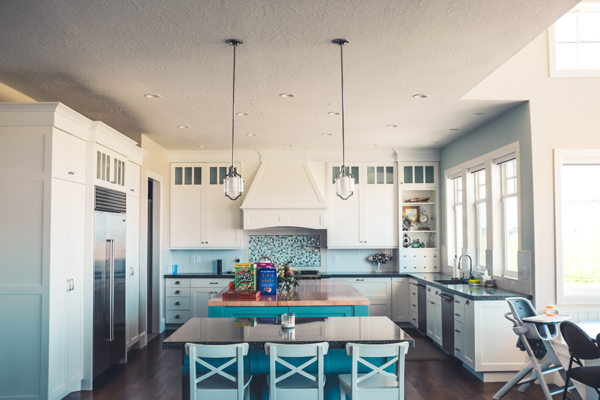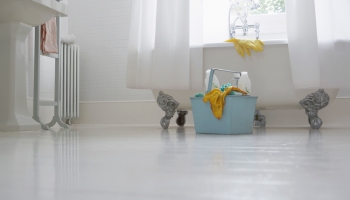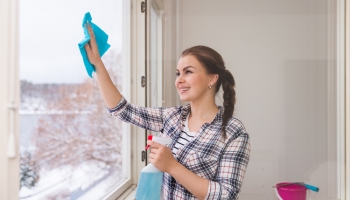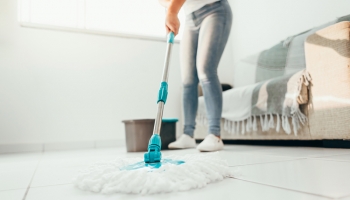
Housekeeping is one of those things we all have to do, but few of us enjoy it. If you have a large house or a busy schedule, it’s easy to fall behind, and even the tidiest of homes often have things that are forgotten about or overlooked.
Germs of all kinds can suppress your immune system and get you sick. Bacteria from raw or undercooked meat, fish (including shellfish), and eggs can cause several types of disease. Preventing the spread of such tiny enemies is extra important in households that include small children with developing bodies or anyone with immune conditions who are more susceptible to bacteria, mold, and mildew,
Everyone is better off with a clean home (clutter can decrease focus while increasing stress and may even contribute to depression), and it will help decrease year-round illnesses. A well-organized space makes it easier to find things, reduces chaos, and lowers stress. Cleaning can also improve air quality by reducing allergens, asthma triggers, and other instigators of breathing problems.
Use Good Cleaning Habits
If you let your home go until it needs a deep cleaning, the prospect of all that work will seem daunting and can take a whole day or more. Fortunately, if you clean regularly and thoroughly, you can build a routine that’s fast and feels effortless. With the right habits, your cleaning duties can be much easier than you might think, and finding these habits can reduce the overall work that needs to be done, free up time for other things, and save money. Below, we’ll cover some simple tips to make your chores a little easier.
Supply Storage:
This idea comes from restaurants, hotels, grocery stores, and event centers where employees are required to keep large public spaces pristine. It can be incredibly time-saving to create a single station to organize all of your cleaning supplies and include a single bucket or caddy to easily carry what you need with you. Keep everything in one place, organized in a way that keeps your prep work to a minimum (and safely away from children or pets).
Keep a Cleaning Schedule:
Because home cleaning involves many small steps, your brain will often feel overloaded with tasks that really don’t take much time at all. You can “hack” your brain to get past this sort of mental overwhelm by keeping a cleaning calendar. Designate a day of the week for each area that must be cleaned — for instance, bathrooms are cleaned Monday and Friday, while dusting is done on Wednesday. Mess around with the calendar to find what works best for you based on your personal schedule.
Disinfecting:
Disinfecting is important for general hygiene and cleanliness, but it’s especially important if a family member is unwell (and spreads germs). Most people remember to disinfect the usual areas — toilet, kitchen counters, sinks, but any surface that is frequently touched should be regularly disinfected. This includes door handles, stairway handholds, and drawers.
Don’t Skimp on the Clean Sheets:
It’s scientifically proven that clean sheets help improve the quality of sleep, and if your sleep quality improves, so does your health, mood, and a number of other life factors. For real, the consequences of sleep deprivation are horrifying.
Dishes, Sinks, and Microwaves:
If you have a new dishwasher, you can skip pre-rinsing because today’s machines and detergents make it a waste of water and time. Some enzymes in your dishwasher actually work better when they can attach themselves to food particles. When it comes to your sink, sanitize by using an eraser-type sponge. And don’t forget to clean the inside of your microwave. You can get rid of especially difficult stains and disinfect at the same time by filling a microwave-safe bowl with one cup of water and a couple of tablespoons of vinegar. Heat it until the window is steamy, let it cool 5 minutes before opening the door, and then clean the inside with a sponge.
Sanitize Your Sponges:
If your cleaning tools are dirty, then you’ll just be spreading germs. In addition to knowing when to replace each tool, make sure you wash them between uses. You can mix ¾ cups of bleach in 1 gallon of water, let them soak for five minutes, then rinse. Easy peasy.
Use the Right Product for the Right Situation
Contrary to popular wisdom, Windex doesn’t work for everything. Proper home cleaning requires the right tools for the job — and that means using the right products for each job.
You can certainly use products with chemicals, but these products can be hard on the lungs and should be used sparingly. There are many natural alternatives that won’t harm those who are particularly sensitive to lung suppressants or that have immune conditions, and many can be made easily with ingredients you might already own. For a variety of cleaning needs, you can make your own natural products using white vinegar, baking soda, or club soda.
If you’re looking to buy a natural product, just remember that “natural” doesn’t always mean “toxin-free” (cyanide is natural, after all). Only purchase products that list all of their ingredients.
Here are a few ways to best handle specific cleaning situations:
- Degreasing: Natural products are your best choice here. Citrus cleaners (orange or lemon) work best.
- Disinfecting: It’s unavoidable to use bleach from time to time, but those occasions should be as limited as possible (and only use non-chlorine bleach). Remember, if your home cleaning habits are good, you won’t need to disinfect as often. When you need to disinfect naturally, tea-tree and eucalyptus products are the best choice.
- Drains: You might think only harsh chemicals can break up tough drain clogs, but enzymes are the best choice. By feeding on the organic materials in your pipes, using enzyme cleaners regularly can keep everything running smoothly.
Cleaning the Air in Your Home:
The average person spends 90% of their time indoors and about a third of a regular day at home under regular conditions (even more so now thanks to the COVID-19 pandemic). Because indoor pollution is actually up to 10x more harmful than outdoor pollution, the quality of the air in your home can largely impact your quality of life. Believe it or not, failing to clean the air in your home can lead to (but is not limited to):
- Runny nose
- Throat irritation
- Eye irritation
- Headaches
- Dizziness
- Fatigue
So how do you know if the air in your home is unclean? Well, first — if you’re doing nothing to keep it clean, that’s a problem. You can also look for signs of poor ventilation such as damp walls, smelly cupboards (on the inside), and issues with bookshelves and shoe racks. There are a number of factors that can create dirty air in your home, depending on your environment. These include:
- Combustion used in heating
- Building and aesthetic materials like paint
- Bio-aerosols such as air fresheners
- Molds in damp or old walls, carpeting, etc.
- Mites, cockroach excrement, and pet dander in furniture and carpet
- Bacteria, viruses, and fungi from unclean surfaces in kitchens and bathrooms
Thankfully, there are a number of steps you can take to make sure your air quality is pristine. These include:
- Proper Cleaning and Disposal: Keep up on home cleaning — especially food leftovers and other disposable garbage items. Not only do these items decay and collect mold, but they also invite bugs.
- Natural Cleaning Solutions: As we covered in the product section above, natural cleaners free of chemicals will help keep harmful fumes out of your home. This is a good idea for everyone, but especially in houses with immunocompromised individuals and children.
- Mopping: When you wet mop (which should be done on a regular basis), be sure to clean not just the floors but also doors and windows, where critters may gather thanks to interior smells.
- Keep an Airflow: When you can, it’s a good idea to keep doors and windows open so that the air in your home moves more freely.
- Carpet Cleaning: Your carpet, furnishings, and other fabrics should be cleaned frequently. Carpets and furniture should be maintained with a vacuum cleaner, its attachments, and a wet-cleaning tool. Curtains, sheets, and pillowcases should also be washed on a regular basis. When possible, remove any carpets or fabrics that can’t be cleaned regularly. To get the most out of your vacuum cleaner, get something with a high-efficiency particulate filter. Whenever you vacuum, use the attachments to clean the furniture as well as in corners.
- Use Better Air-Freshening Habits: Don’t use air fresheners or pesticides. Instead, confront the air-scent and pest problems by keeping up on cleaning and using natural solutions, like candles for scent and a 1:1 solution of water and vinegar for cockroaches and spiders.
- Reduce Dampness: Even without mold, water can cause respiratory problems. Be sure to dry up any spills quickly and thoroughly, and don’t leave standing water anywhere for long.
Indoor plants are wonderful for your health for a number of reasons, but one of the most miraculous is that they scrub the air in their vicinity (neat, right?). Many plants are easy to keep, requiring just dry soil (with the occasional watering) and indirect sunlight. Some of the best plants to clean toxins from the air are:
- Spider Plant: Cleans off benzene, formaldehyde, carbon monoxide, and xylene. Easily transplanted, prefers dry soil and sunlight just like real spiders. Non-toxic to pets.
- Aloe Vera: Filters out formaldehyde and benzene. Easy to grow. Can be mildly to moderately toxic to pets, so keep in a high place.
- Bamboo Palm: Filters out benzene and trichloroethylene.
- Peace Lily: An important heads up — Peace Lily is dangerous to pets and children, so don’t use it if there are little creatures running around your home who might ingest the leaves. That said, it’s also NASA-recommended to remove common Volatile Organic Compounds (VOCs) like formaldehyde and trichloroethylene as well as toluene and xylene. The Peacy Lily needs shade and once-a-week watering.
- Ficus: This is also not safe for cats and dogs, but it filters out pollutants from carpets and furniture like formaldehyde, benzene, and trichloroethylene. A Ficus can be kept indoors with indirect, bright sunlight.
The Best Solution for a Clean Home
Cleaning regularly will help minimize your need for professional cleaning — but it’s still wise to have your home professionally cleaned at least once a year. When you need the job done right and quickly, Bliss Maid Services is here for you. Visit us online to view our services and receive a free quote.



